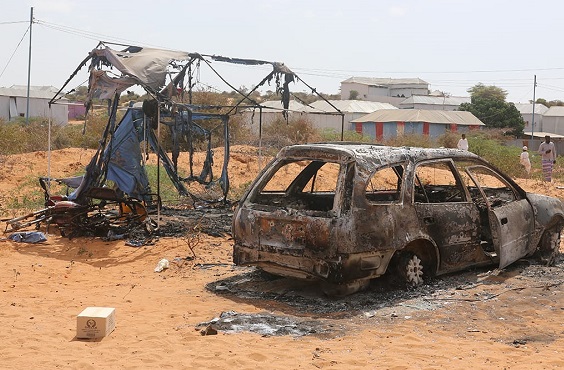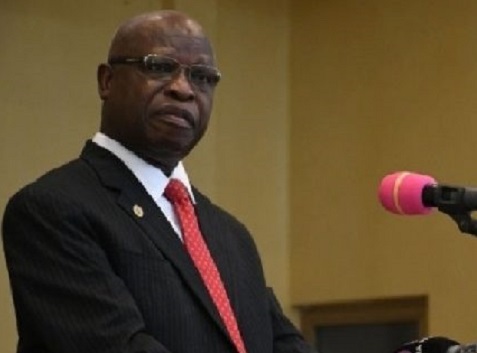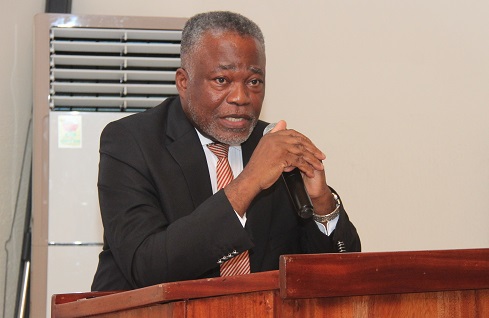
West Africa security situation: Coups step up terrorist acts - Report
A mid-year review of violence involving African militant Islamist groups has observed spikes in violence and fatalities that coincide with the military coups in those countries.
Advertisement
Data from the African Center for Strategic Studies indicates a surge in fatalities in the Sahel and Somalia.
The Washington D.C-based academic institution within the US Department of Defense said fatalities linked to militant Islamist groups reached 22,288 over the past 12 months.
This represents a 48 per cent increase from the same period last year that saw 15,024 fatalities.
“This level of fatalities is about 2.5 times more than the pace experienced a decade ago and higher than the record 20,562 set in 2015, mostly driven by Boko Haram’s lethal use of violence,” the report which was released recently stated.
The centre, which has a mission to ensure security for all Africans championed by effective institutions accountable to their citizens, said the Sahel continued to be the region experiencing the most violent events and fatalities.
Burkina Faso, Mali
"Eighty-seven per cent of the violent events in the Sahel are concentrated in Burkina Faso and Mali.
The observed spikes in violence coincide with the military coups in those countries,” the study said.
Other Trending Stories
That, the report suggested, reflected the opportunity militants seized when the Malian military junta scuttled the United Nations Mission in Mali (MINUSMA) and international security partnerships, while inviting the Russian Wagner Group paramilitary forces.

Brig. Gen. Dan Frimpong (retd)
Burkina Faso, the data showed, continued to bear the brunt of violence in the Sahel, accounting for more than 50 per cent of the reported events linked to militant Islamist groups in the theatre for a second year in a row.
“Burkina Faso also accounted for 62 per cent of all fatalities in the region,” the report said, adding that over the past year, Burkina Faso saw an 88 per cent increase in fatalities, comprising 6,130 deaths,” the African Centre for Strategic Studies stated.
Benin and Togo have each experienced a dramatic rise in violent events over the last year (to 131 from 16 in Benin, and to 22 from three in Togo).
This represents a combined eight-fold increase in violent events.
What was previously seen as episodic spillover from Burkina Faso into West Africa’s littoral states has become an ongoing security threat in these countries.
Benin and Togo experienced 140 and 98 reported fatalities respectively as a result of this violence in the past year.
Fatalities
"Eighty per cent of these fatalities and events are happening in the Sahel and Somalia, which saw spikes in annual militant Islamist-linked deaths of 39 and 157 per cent, respectively.
The Sahel continues to be the region experiencing the most violent events (2,912) and fatalities (9,818)," it said.
However, the report found significant drops in militant Islamist violence in North Africa and northern Mozambique, which helped to moderate the continental increase in violent events, which rose four per cent.

Col Festus Aboagye (retd)
Nonetheless, the centre said Africa had experienced a nearly four-fold increase in reported violent events linked to militant Islamist groups over the past decade, from 1,812 events in 2014 to 6,756 events this year.
"Almost half of that growth happened in the last three years," the report added.
Advertisement
Experts
Commenting on the data, two security experts expressed similar views that the coups were not necessarily due to terrorism or the threat of it.
Brig. Gen. Dan Frimpong (retd) and Col.
Festus Aboagye (retd) drilled the issue of coups down to good governance and welfare of the people.
Commenting on the data, Col Festus Aboagye (retd), said terrorism or the threat of it was not causing coup d'etats.
Rather, he said, it was the tension around how the state was managing its security policies and strategies.
Advertisement
"So my understanding is that it is not the terrorism, it is how you manage your security policies and strategies," Col Aboagye told the Daily Graphic in an interview.
On the situation of ECOWAS moving into Niger, he said, in a crisis situation the response should not be like it was going to teach it (Niger) a lesson.
The best thing to do, he pointed out, was to sit down and find out why such a thing was happening so that it would not occur in another country.
For instance, Col Aboagye said, there had been eight attempts by some African leaders to change their constitutions in order to prolong their tenure
Advertisement
“The unconstitutionality by some leaders to stay in power was what should engage the regional body, ECOWAS,” he stated.
Col Aboagye said coups did not happen because soldiers wanted to come and do better than civilians; "they happen because it is a switch that switches on and off in order to reset".
Commenting on the issue of democracy, he said, it was accountability that must be adhered to.
For his part, Brig. Gen. Frimpong (retd) said the solution to the problem of coup d'etats in the sub-region was good governance.
He said, for instance, once the people thought their welfare was being taken care of by those ruling, there would be no cause for any upheaval.
Impatient
Responding to a question as to whether soldiers staging coups were impatient, Brig. Gen. Frimpong said that was not the case and that it was the society that rebelled and the military was the face.
He said like members of other professions were trained to do their work, soldiers were also trained to keep the security of a country "so it is not that soldiers are not patient".
Brig. Gen. Frimpong, however, said like any institution, there were bad lots who would do what generally the military did not endorse.
He explained that the military was not a coup making institution and that soldiers were not taught how to make coups, adding that it was a response from a few individuals who had their own problems and then pulled the military along.
Any coup maker, he said, was not a good soldier and that as a professional soldier he never believed in that.
The military, he said, was not designed to rule, but to safeguard the territorial integrity of the nation by land, sea and air.




